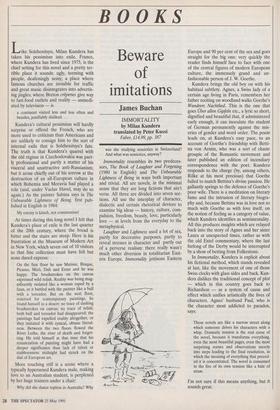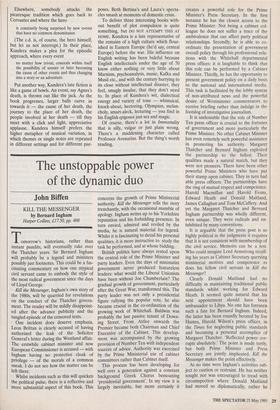BOOKS
Beware of imitations
James Buchan
IMMORTALITY by Milan Kundera translated by Peter Kussi Faber, £14.99, pp. 387 Like Solzhenitsyn, Milan Kundera has taken his pessimism into exile. France, where Kundera has lived since 1975, is the chief setting for this novel and a pretty ter- rible place it sounds: ugly, teeming with people, deafeningly noisy; a place where famous churches are invisible for traffic and great music disintegrates into advertis- ing jingles; where Breton creperies give way to fast-food outlets and reality — unmedi- ated by television — is
a continent visited less and less often and besides, justifiably disliked.. .
Kundera's cultural pessimism will hardly surprise or offend the French, who are more used to criticism than Americans and are unlikely to consign him to the sort of internal exile that is Solzhenitsyn's fate. The truth is that Kundera's quarrel with the old regime in Czechoslovakia was part- ly professional and partly a matter of his visceral and unattractive anti-Russianism; but it arose chiefly out of his sorrow at the destruction of an all-European culture in which Bohemia and Moravia had played a role (and, under Vaclav Havel, may do so again.) As the painter Sabina says in The Unbearable Lightness of Being, first pub- lished in English in 1984:
My enemy is kitsch, not communism!
At times during this long novel I felt that Kundera's place of exile is the last quarter of the 20th century, where the bread is bitter and the stairs are steep. Here is his frustration at the Museum of Modern Art in New York, which seven out of 10 visitors to that fine collection must have felt but none dared express:
On the first floor he saw Matisse, Braque, Picasso, Miro, Dali and Ernst and he was happy. The brushstrokes on the canvas expressed wild relish. Reality was being mag- nificently violated like a woman raped by a faun, or it battled with the painter like a bull with a toreador. But on the next floor, reserved for contemporary paintings, he found himself in a desert: no trace of dashing brushstrokes on canvas; no trace of relish; both bull and toreador had disappeared; the paintings had expelled reality altogether, or they imitated it with cynical, obtuse literal- ness. Between the two floors flowed the River Lethe, the river of death and forget- ting. He told himself at that time that his renunciation of painting might have had a deeper significance than lack of talent or stubbornness: midnight had struck on the dial of European art.
More touching still is a scene where a typically hypersexed Kundera male, making love to an Australian student, is perplexed by her huge trainers under a chair:
Why did she dance topless in Australia? Why was she studying semiotics in Switzerland? And what was semiotics, anyway?
Immortality resembles its two predeces- sors, The Book of Laughter and Forgetting (1980 in English) and The Unbearable Lightness of Being in ways both important and trivial. All are novels, in the minimal sense that they are long fictions that ain't verse. All three are divided into seven sec- tions. All use the interplay of character, dialectic and certain rhetorical devices to examine big ideas — history, culture, com- pulsion, freedom, beauty, love, particularly love — at levels from the everyday to the metaphysical.
Laughter and Lightness used a lot of sex, partly for decorative purposes, partly to reveal stresses in character and partly out of a perverse realism: there really wasn't much other diversion in totalitarian East- ern Europe. Immortality jettisons Eastern Europe and 90 per cent of the sex and goes straight for the big one: very quickly the reader finds himself face to face with one of the central figures of modern European culture, the immensely grand and un- fashionable person of J. W. Goethe.
Kundera brings the old boy on with his habitual subtlety. Agnes, a Swiss lady of a certain age living in Paris, remembers her father reciting on woodland walks Goethe's Wandrers Nachtlied. This is the one that goes Uber alien Gipfeln etc., a lyric so short, dignified and beautiful that, if administered early enough, it can inoculate the student of German permanently against the mis- eries of gender and word order. The poem leads on, at Kundera's easy pace, to an account of Goethe's friendship with Betti- na von Arnim, who was a sort of chaste groupie of the Romantic movement and later published an edition of incendiary correspondence with the poet. Kundera responds to the charge (by, among others, Rilke at his most precious) that Goethe failed to match Bettina's divine passion. He gallantly springs to the defence of Goethe's poor wife. There is a meditation on literary fame and the intrusion of literary biogra- phy and, because Bettina was in love not so much with Goethe as with love itself, on the notion of feeling as a category of value, which Kundera identifies as sentimentality. All this produces insights which are relayed back into, the story of Agnes and her sister Laura at unexpected times, rather as with the old Extel commentary, where the last furlong of the Derby would be interrupted by a show of betting from Folkestone.
In Immortally, Kundera is explicit about his fictional method, which stands revealed at last, like the movement of one of those Swiss clocks with glass sides and back. Kun- dera dislikes the traditional concept of plot — which in this country goes back to Richardson — as a system of cause and effect which unifies artistically the lives of characters. Agnes' husband Paul, who is the character most addicted to paradox, says:
These novels are like a narrow street along which someone drives his characters with a whip. Dramatic tension is the real curse of the novel, because it transforms everything, even the most beautiful pages, even the most surprising scenes and observations merely into steps leading to the final resolution, in which the meaning of everything that preced- ed it is concentrated. The novel is consumed in the fire of its own tension like a bale of straw.
I'm not sure if this means anything, but it sounds great. Elsewhere, somebody attacks the picaresque tradition which goes back to Cervantes and where the hero
is constantly being surprised by new events that have no common denominator.
(The c.d. is, of course, the hero himself, but let us not interrupt.) In their place, Kundera makes a plea for the episodic approach, where every event
no matter how trivial, conceals within itself the possibility of sooner or later becoming the cause of other events and thus changing into a story or an adventure.
Put another way, Kundera's late fiction is like a game of bowls. An event, say Agnes's death, is thrown out like the jack. As the book progresses, larger balls curve in towards it — the cause of her death, the journey to the place of her death, the people involved at her death — till they meet with a click and light, appreciative applause. Kundera himself prefers the higher metaphor of musical variation, in which themes or single notes are repeated in different settings and for different pur- poses. Both Bettina's and Laura's specta- cles smash at moments of domestic crisis.
To deliver three interesting books with- out benefit of plot compulsion is quite something, but DO NOT ATTEMPT THIS AT HOME. Kundera is a late representative of the remains of a high culture which flour- ished in Eastern Europe (he'd say, central Europe) before the war. His influence on English writing has been baleful because English intellectuals under the age of 70 know either nothing or very little about Marxism, psychoanalysis, music, Kafka and Musil etc., and with the century hurrying to its close without intellectual disaster, they feel, smugly insular, that they don't need to. In place of Kundera's wit, dialectical energy and variety of tone — whimsical, knock-about, hectoring, Olympian, melan- choly, smart-aleck, lecturing — you find in his English epigonoi just sex and magic. Of course, there's a lot in Immortality that is silly, vulgar or just plain wrong. There's a maddening character called Professor Avenarius. But the thing's worth reading.



















































 Previous page
Previous page